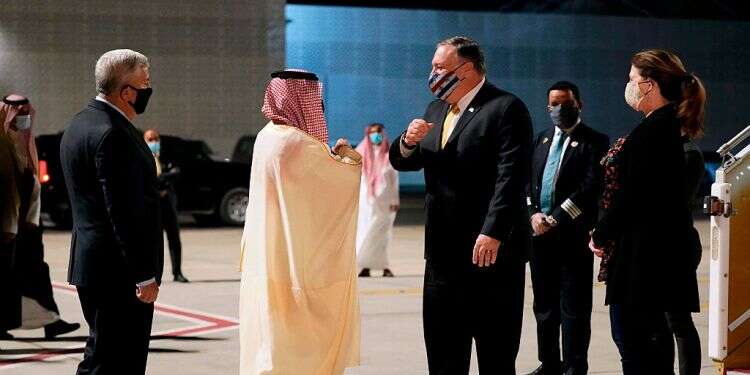The leaks on the reported meeting between Saudi Crown Prince Mohammad Bin Salman, US Secretary of State Mike Pompeo and Prime Minister Benjamin Netanyahu – and the fact that the military censorship gave them a green light for publication – suggest that there has been a major breakthrough in relations between Jerusalem and Riyadh. It could mean that a peace deal is in the offing or at the very least a normalization agreement. Such a development, whether in the form of a full-fledged peace treaty or an end to mutual hostility as was the case with Sudan, would transform the geopolitical dynamics in the region.
Follow Israel Hayom on Facebook and Twitter
In the wake of Donald Trump's defeat and the victory of Democratic challenger Joe Biden, many pundits have speculated that the Abraham Accords – namely, the peace deals between Israel, Bahrain and Sudan – would be undercut. After all, without the US providing the diplomatic tutelage for this process, without its mediation efforts, and without the Trump administration's determination to move forward independent of the Israeli-Palestinian track, the possibility that things would continue along the same trajectory was questionable. But it appears that the real answer was provided on Monday with the leaks.
The special relationship being forged between Israel, Saudi Arabia and the Gulf states has been in the making long before the 45th president entered the White House. The secret affair has begun in the wake of regional processes that date to the 1990s and have intensified in the wake of the Arab Spring some 10 years ago.
These processes and the downfall of regimes in the Middle east they precipitated, combined with the rising threat from Iran and the growing isolationist streak in the Obama administration, continued during the Trump presidency and slowly but surely helped the bring Israel and the Gulf closer.
This led to an underlying assumption in Jerusalem, Riyadh, Cairo, Abu Dhabi, Bahrain came about, including in Amman, which practically always takes the Palestinian stance. That assumption was that if the Biden administration shows a conciliatory tone toward Tehran, only a strong regional pact between Israel and Sunni moderate Arab states can check the Iranian march toward the bomb. Only such an alliance would enable other major developments in the region, and chiefly among those developments is the resumption of talks between Israel and the Palestinians and a formalized truce between Israel and terrorist groups in the Gaza Strip.
Thus, the meeting on Sunday sends a clear message to the new administration in Washington, and even more so to the ayatollah regime in Tehran. The message is that the region has a responsible leadership that is ready for cross-border cooperation that would lead to peace and prosperity for all involved.
Subscribe to Israel Hayom's daily newsletter and never miss our top stories!




